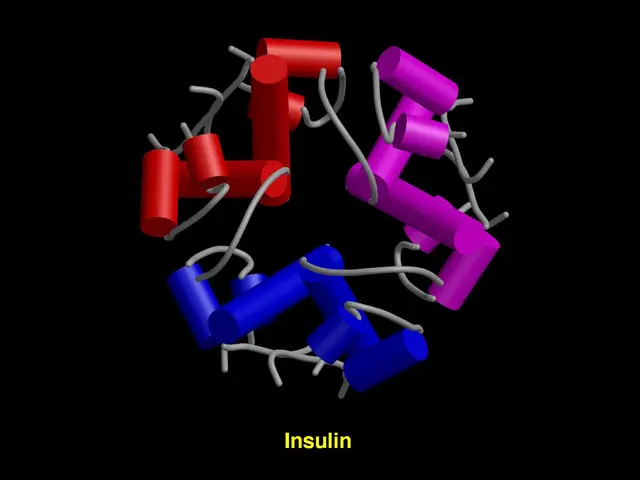Diagnoses connected to HIV: Pneumonia, meningitis, and other related health issues
Pneumocystis pneumonia (PCP) is a common AIDS-defining illness, occurring in about 40% of cases, and is characterised by symptoms such as fever, dry cough, difficulty breathing, and chest pain. This respiratory infection can be prevented, in part, through vaccines for influenza, PCV13, and PCV23.
HIV wasting syndrome is another significant AIDS-defining illness, characterised by unintentional weight loss, chronic diarrhea, fever, weakness, and fatigue. Unfortunately, there are no standard treatment options for this condition.
Esophageal candidiasis, caused by the fungus Candida, can affect the throat and cause painful swallowing, difficulty swallowing, and white patches in the mouth or throat. This is not an AIDS-defining illness, but people with HIV are at a higher risk of developing candida infections.
Kaposi’s sarcoma (a cancer caused by HHV-8) is a cancer that forms purplish or brownish lesions on the skin or mucous membranes, sometimes involving internal organs. This is an AIDS-defining illness.
Lymphomas, including Burkitt’s lymphoma and primary central nervous system lymphoma, are types of cancer that can occur in people with HIV. Symptoms include swelling of lymph nodes, fever, unexplained weight loss, and neurological symptoms if the central nervous system is involved.
Cervical cancer, associated with HPV infection, can also affect people with HIV. Symptoms include abnormal vaginal bleeding, pelvic pain, and pain during intercourse.
Tuberculosis (TB), caused by the Mycobacterium tuberculosis bacteria, is a leading cause of death in people with AIDS. It leads to lung infections and symptoms such as persistent cough, fever, night sweats, and weight loss.
Cryptococcal meningitis, a form of meningitis caused by a fungal infection, affects the brain and spinal cord, causing symptoms such as headache, fever, neck stiffness, sensitivity to light, and confusion. This is an AIDS-defining illness, with approximately 150,000-200,000 deaths annually.
Other common symptoms of AIDS include prolonged fever, night sweats, swollen lymph nodes, chronic diarrhea, oral and genital sores, recurrent respiratory infections, neurological symptoms like memory loss and depression, and generalised weakness.
AIDS is clinically defined as having a CD4+ T-cell count below 200 cells/μL or the presence of one or more AIDS-defining illnesses. The introduction of antiretroviral therapy (ART) has significantly reduced the occurrence of AIDS-defining illnesses.
Sources: - Wikipedia - HIV/AIDS (2025-08-05) - MedicineNet - HIV stages and symptoms (2025-07-15) - WHO Fact Sheet on HIV/AIDS (2025-07-15)
- Science continues to explore treatment options for HIV-related chronic diseases, such as non-Hodgkin's lymphoma, which can occur in people with HIV.
- In the context of health-and-wellness, Mental Health is as important as fitness-and-exercise, eye-health, and hearing, all part of maintaining overall well-being.
- Despite advancements in medical-conditions like Paxlovid for combating viruses, tuberculosis (TB) remains a significant challenge for people living with HIV.
- AIDS affects more than just the respiratory system; it can also lead to chronic diseases like cancer, in addition to life-threatening conditions such as Kaposi’s sarcoma.
- The medical community is working on retargeting treatments for HIV and chronic diseases like tuberculosis, aiming to create personalized treatment approaches.
- While vaccines can help prevent infections like PCP, the broader aspect of health-and-wellness encompasses fitness-and-exercise, mental health, skin care, and diet, among other factors.
- HIV wasting syndrome is just one of many AIDS-defining illnesses, alongside respiratory conditions like Pneumocystis pneumonia and chronic diseases like Kaposi’s sarcoma.
- The early detection and treatment of chronic diseases associated with HIV, like TB and Kaposi’s sarcoma, can significantly reduce the risk of complications and improve the quality of life for patients.
- Regular medical check-ups are crucial for people with HIV, as they increase the chances of early detection and effective treatment of conditions like tuberculosis and Kaposi’s sarcoma, which are both AIDS-defining illnesses.





